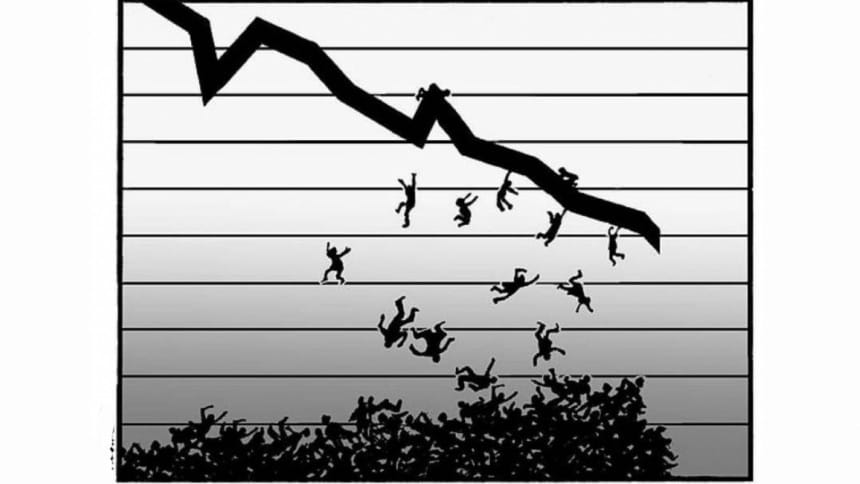Consequences of wrong economics

Martin Luther King once said that injustice anywhere is a threat to justice everywhere. This is more so when it comes to economic policy in a market economy. A wrong, non-market interest rate on Sanchaypatra or National Savings Certificates (NSCs) has been a threat to all other interest rates in the banking sector.
The repercussions have begun to surface in three ways: i) NSCs are soaking up a major share of the nation's deposit, creating liquidity crisis in banks; ii) Commercial banks have been forced to raise deposit rates to attract more deposits; and iii) Rising deposit rates have pushed lending rates higher, making investment more expensive. An increase in saving and deceleration in investment will lower future growth by making the regime's aspirational goals simply impossible. All these stemmed from one injustice: the wrong rate on Sanchaypatra—a fatty cash cow to please the rich in the name of helping the poor.
In 2015, the then BB governor Dr Rahman drew my attention to a financial column written by no less than a Dhaka University economics professor who justified the super high rates of NSCs. The professor argued that the non-market NSC rates worked within limited savers and they didn't disturb the normal growth of the capital market. How can that be? Who would be foolish enough to go to the capital market if the risk-free NSC rate is much higher than the return from the stock market? Say, the NSC rate is 12 percent and the return on the stock market is 15 percent. People will still prefer buying NSCs because they are entirely risk-free. Only three percent risk premium is not enough to stimulate the stock market. That is why we have seen the stock market index make an upward jump in any country following a cut in the risk-free rate by the central bank.
The weakness in the stock market (for years) is substantially attributable to abnormal NSC rates. The recent liquidity crisis is heavily attributable to non-bank NSC rates. The reason why we couldn't build a healthy bond market and national pension fund is strongly attributable to nonsensical NSC rates. The nation's investment fatigue and saving craze, which are undesirable at this growing stage of the economy, are attributable to super-high NSC rates.
NSCs work as the second largest charity programme for the affluent while the single largest charity fundraising for the super-rich is the default culture. The reason why doing business in Bangladesh is unattractive to young entrepreneurs is because of these artificially high NSC rates.
One injustice is causing multiple macro imbalances in the economy by harming the banking sector, investment, growth, and eventually employment. The only way to address this injustice is to dismantle the National Saving Directorate and give the task of mobilising savings entirely to the banking sector led by BB. Then the government's borrowing from the banking sector will help to keep the interest rates market-determined and thus reasonable. Maintaining two deposit rates in a single national market in a Lord Clive's dual-rule style is disturbing and disruptive for the natural growth of the banking sector. In the latest monetary policy statement, the central bank has explicitly stated its resentment regarding the ridiculously high NSC rates. The central bank should be the sole authority to play with the nation's interest rates of any kind. The government's intervention through the Saving Directorate is counterproductive and detrimental to building fiscal capacity as well. Our politics and politicians should understand the grave consequences of wrong economics.
It was almost decided for sure before the last budget that VAT would be implemented. Suddenly the government succumbed to the pressure of the business lobby and scrapped VAT, keeping the weak fiscal capacity the same as before. Ours is the most privileged business lobby in the world, which enjoys the lowest tax-GDP ratio among all comparable peer nations on earth. The lobby has enough influence on the government to have all the rules in their favour—both political and economic. Why else did the government not go for VAT and progressive taxes on the rich?
The indulgence came from the cavity of injustice: Sanchaypatra. The government knew well that the loss of Tk 30,000 crore because of not implementing VAT will be more than compensated by the desperate cash cow of Sanchaypatra, which will produce almost Tk 60,000 crore in 2018. This is the bad economics of expensive borrowing. The government is recklessly increasing the future burden of interest liability by eventually eroding its development budget and thus growth potentials. Our growth acceleration is doomed to fail because of indulging the injustice by temporarily making a group of people happy and in the process ruining the future of people at large. The price of paying for this injustice will be high if we can't stop it soon enough.
In the last four years, everyone who attempted to justify NSC rates by manufacturing weak theories is actually a direct beneficiary of this non-market scheme. It is strange when someone attempts to justify the instrument as a welfare tool without understanding whose welfare it is serving the most. One writer recently tried to say that the government would have to borrow at a higher rate if there hadn't been NSCs. That is wrong. Even the private companies are borrowing from overseas at almost half the NSC rates. The rate would certainly be lower for the government.
NSCs weakened the fiscal capacity by over-pampering the government. Trade deficits warrant our currency depreciation. But how would that happen in the face of rising interest rates which aren't inflation-driven? Current account imbalances will be aggravated if NSC rates are not rationalised with the market. One injustice is fuelling other macro imbalances just like a bad policy drives all the fruits of other good policies away.
Biru Paksha Paul is associate professor of economics at the State University of New York at Cortland. Email: [email protected]





Comments